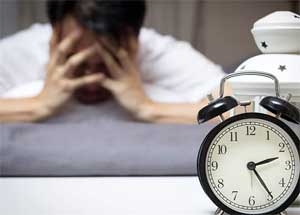- Home
- Editorial
- News
- Practice Guidelines
- Anesthesiology Guidelines
- Cancer Guidelines
- Cardiac Sciences Guidelines
- Critical Care Guidelines
- Dentistry Guidelines
- Dermatology Guidelines
- Diabetes and Endo Guidelines
- Diagnostics Guidelines
- ENT Guidelines
- Featured Practice Guidelines
- Gastroenterology Guidelines
- Geriatrics Guidelines
- Medicine Guidelines
- Nephrology Guidelines
- Neurosciences Guidelines
- Obs and Gynae Guidelines
- Ophthalmology Guidelines
- Orthopaedics Guidelines
- Paediatrics Guidelines
- Psychiatry Guidelines
- Pulmonology Guidelines
- Radiology Guidelines
- Surgery Guidelines
- Urology Guidelines
Poor sleep quality may lead to atrial fibrillation

Poor sleep quality independent of obstructive sleep apnea (OSA) might be an important risk factor for atrial fibrillation, according to a study published in the journal HeartRhythm.
Gregory M. Marcus, Electrophysiology Section, Division of Cardiology, Department of Medicine, University of California, San Francisco, California, and colleagues conducted the study to determine whether poor sleep independent of OSA, is a risk factor for atrial fibrillation.
Atrial fibrillation (AF) is an irregular, rapid heart rate that may cause symptoms such as heart palpitations, fatigue, and shortness of breath. It can substantially reduce the quality of life and is associated with heightened risks of stroke, dementia, heart attack, kidney disease, and death. OSA has been established as a risk factor for AF, but the mechanism is unclear. While episodes of abnormally slow or shallow breathing (hypopnea) and apnea may cause cardiopulmonary stress, induce inflammation, and contribute to cardiovascular disease, OSA also results in poor sleep. Aspects of poor sleep such as altered sleep duration, efficiency, and architecture have been linked to other cardiovascular diseases.
"While a relationship between sleep apnea and AF has previously been demonstrated, the effect of sleep itself on AF risk has remained unknown," explained Dr. Marcus. "Strategies to enhance sleep quality are different from those that focus on relieving airway obstruction, so it is important to understand the relationship between sleep itself and AF."
Investigators drew on four different studies to determine whether poor sleep itself is a risk factor for AF. First, they used the global, internet-based Health eHeart Study and determined that individuals with more frequent nighttime awakenings while trying to sleep more often carried a diagnosis of Atrial fibrillation(AF). They then validated these findings by using the NIH-funded Cardiovascular Health Study, a prospective cohort study, in which they found that individuals who reported more frequent nighttime awakenings at baseline exhibited a higher risk of developing AF both before and after adjustment for potential confounders.
Within a subset of these individuals who had undergone formal sleep studies, they found that less REM sleep in particular predicted future AF. Finally, in order to see if these findings were readily translatable to patients already seen in healthcare settings and recognized by their providers as having sleeping difficulty, they drew on the California Healthcare Cost and Utilization Project (HCUP), a set of medical records databases of all California residents aged 21 or older who received care in a California ambulatory surgery unit, emergency department, or inpatient hospital unit between January 2005 and December 2009. Among several million people, the HCUP data confirmed that a diagnosis of insomnia predicted a diagnosis of AF both before and after adjustment for potential confounding effects.
Key Findings:
- Among 4553 Health eHeart participants, the 526 with AF exhibited more frequent night time awakening.
- In 5703 Cardiovascular Health Study participants followed for a median 11.6 years, frequent nighttime awakening predicted a 33% greater risk of AF.
- In patients with polysomnography (N = 1127), every standard deviation percentage decrease in rapid eye movement (REM) sleep was associated with an 18% higher risk of developing AF.
- Among 14,330,651 California residents followed for a median 3.9 years, an insomnia diagnosis predicted a 36% increased risk of new AF.
- Sleep quality is important to cardiovascular health and specifically to AF.
- There was no evidence that sleep duration per se was a risk factor for AF.
- Researchers consistently found sleep disruption to be an important risk factor for AF.
This is the first study to demonstrate a relationship between worse sleep quality independent of sleep apnea and a higher risk of AF. "These data provide compelling evidence that sleep quality itself, even independent of sleep apnea, is an important determinant of AF risk," noted Dr. Marcus. "While there are several available treatments for AF, prevention of the disease would be ideal. The good news is that sleep quality can be modifiable and is something that at least to some degree is under the control of the individual. It's possible that improving sleep hygiene, such as performing regular exercise, getting to bed at a reasonable hour on a regular basis, and avoiding viewing screens before bed as well as caffeine later in the day, might help stave off AF."
Based on the study, the authors concluded that sleep disruption consistently predicted AF before and after adjustment for OSA and other potential confounders across several different populations. Sleep quality itself may be important in the pathogenesis of AF, potentially representing a novel target for prevention.
For more information click on the link: http://dx.doi.org/10.1016/j.hrthm.2018.05.008

Disclaimer: This site is primarily intended for healthcare professionals. Any content/information on this website does not replace the advice of medical and/or health professionals and should not be construed as medical/diagnostic advice/endorsement or prescription. Use of this site is subject to our terms of use, privacy policy, advertisement policy. © 2020 Minerva Medical Treatment Pvt Ltd